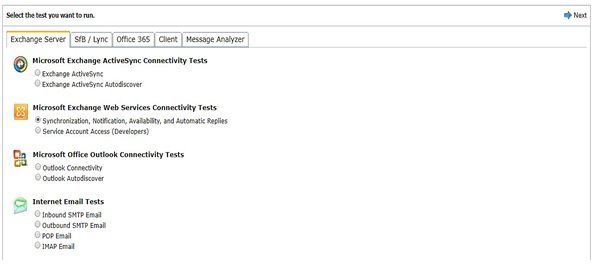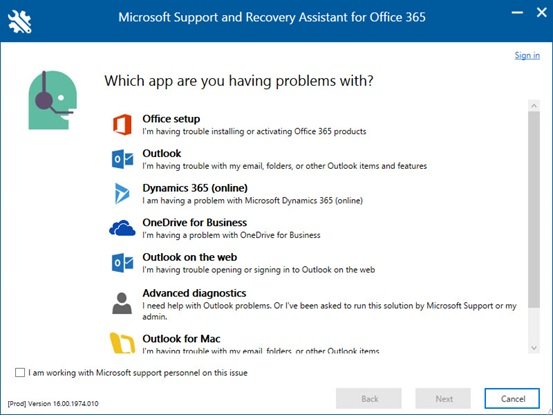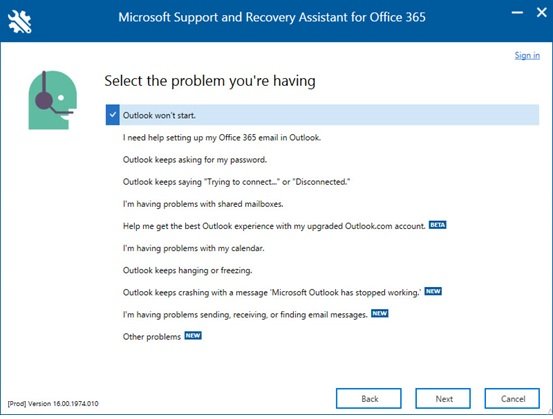Formally released as Exchange Server Remote Connectivity Analyzer, Microsoft Remote Connectivity Analyzer is a tool for analyzing, troubleshooting, and fixing Office 365 apps and other Microsoft services. The tool houses a collection of web-based tools that enable users to simulate the communication channel between the Exchange client and various environments.
If you are an administrator, it is a must-have tool that can help you diagnose several issues, like Outlook account setup, connectivity issues, password issues, or Outlook stops responding or crashes. It addresses common connectivity issues for servers with Exchanges, Teams, Skype, and Office 365. It analyzes remote connectivity for Microsoft services and checks if they are set up and configured properly. All the tests are performed from the testconnectivity website to the service in question, either on an On-Premises server or Office 365.
Microsoft Remote Connectivity Analyzer
Below are the tests you can perform using Microsoft Remote Connectivity Analyzer – they are grouped under respective tabs as shown in the screenshot.

1. Exchange Server:
All tests under this tab are for On-Premises Exchange or hybrid Exchange installs.
The tests under this tab are:
Microsoft Exchange ActiveSync Connectivity Tests
- Exchange Activesync: This test creates a step-by-step process which a mobile device uses to connect to an Exchange Server using Exchange Activesync.
- Exchange Activesync Autodiscover: It analyzes steps that an exchange Activesync device uses to obtain settings from the Autodiscover service.
Microsoft Exchange Web Services Connectivity Tests
- Synchronization, Notification, Availability, and Automatic Replies: This is a basic test that is especially helpful for IT administrators to address external access using Entourage EWS or other Web Services clients. It analyzes many basic Exchange Web Services tasks to confirm they’re working.
- Service Account Access: This test is more specifically used by application developers. It verifies a service account’s ability to access mailboxes with alternate credentials, create and delete items in it, and access it via exchange Impersonation.
Microsoft Office Outlook Connectivity Tests
- Outlook Connectivity: This test analyzes the steps Outlook uses to connect from the internet by testing connectivity using both the RPC over HTTP and the MAPI over HTTP protocols.
- Outlook Autodiscover: This test goes through the steps that Outlook uses to obtain settings from the Autodiscover service.
Internet Email Tests
- Inbound SMTP Email: It inspects the steps that an Internet email server uses to send inbound SMTP email to your domain.
- Outbound SMTP Email: It checks the outbound IP address for Reverse DNS, Sender ID, and RBL checks.
- POP Email: It goes through the steps an email client uses to connect to a mailbox using POP3.
- IMAP Email: It examines an email client’s process to connect to a mailbox using IMAP4.
2. Office 365
All of the available tests can be used to test Exchange Online infrastructure. Here are the tests mentioned under this tab:
Office 365 General Tests:
- Office 365 Exchange Domain Name Server (DNS) Connectivity Test: As the name suggests, it checks the external domain name settings for your verified domain in Office 365 and finds out any issues with mail delivery such as not receiving incoming email from the Internet and Outlook client connectivity issues that involve connecting to Outlook and Exchange Online.
- Office 365 Lync Domain Name Server (DNS) Connectivity Test: It checks the external domain name settings for your custom domain user in Office 365.
- Office 365 Single Sign-On Test: It validates if there is no issue in logging on to Office 365 with your on-premises credentials and some basic Active Directory Federated Services (ADFS) configuration.
Other tests under this tab category like Exchange ActiveSync Connectivity Tests, Exchange Web Services Connectivity Tests, Office Outlook Connectivity Tests and Internet Email Tests of Office 365 are similar to the Exchange server’s tests.
Microsoft Support and Recovery Assistant for Office 365
Microsoft Support and Recovery Assistant is a new tool for solving common Office 365 problems. The app can troubleshoot and fix several common Outlook problems, help install the Office client, and run various checks to ensure account settings are correct.
To start using it, download and run it. The tool will prompt you to select which app you have the problem with (refer below).

After that, you will be asked to select the problem.

After it runs a series of diagnostic tests, the Support and Recovery Assistant can either fix any problems it finds or tell the user how to fix the problems. The test results are saved in a log file, which users can share with their Office 365 admin or a support engineer. Each time you run the Support and Recovery Assistant, it automatically updates itself to the latest version
3. Skype for Business/Teams:
These tests are for all clients, including on and off-premises. The tests mentioned under this tab are:
Microsoft Skype for Business Tests
- Skype for Business Server Remote Connectivity Test: It tests the connectivity to Skype for a business server.
- Skype for Business Autodiscover Web Service: This test is used to confirm the remote connectivity for mobile devices and the Skype for Business Windows Store app to your on-premises Skype for Business Autodiscover web service server by establishing a secure HTTPS connection for the root token.
- Microsoft Office Communications Server Tests
- Office Communications Server Remote Connectivity Test: It tests the remote connectivity to the Microsoft Office Communication Server
4. Message Analyzer:
This tab can be used to analyze email headers, using which you can perform the following functions.
- View the most important properties and total delivery time at a quick glance.
- Analyze the received headers and displays the longest delays quickly for easy discovery of sources of message transfer delays.
- Sort all headers by header name or value.
- Quickly collapse the sections that you don’t need.
This is useful for an email header generated by Exchange, Office 365, or any other RFC standard SMTP server or agent.
Troubleshooting Office 365 apps & services issues
All you have to do is visit the web URL and choose the test you want to perform. After the tests are executed, Microsoft Remote Connectivity Analyzer locates the origin of the failure and suggests tips on how to troubleshoot the issue.
It also offers to automatically fix problems for users or provide instruction on recommended solutions. All the diagnostics results are saved in a log file for users to share with their Office 365 admin or support engineers for further investigation.
Microsoft Remote Connectivity Analyzer is a very useful and a mandatory tool that every Exchange on-premises or Exchange Online administrator should be familiar with. Click here to start using the tool.
What are some features of Microsoft Remote Connectivity Analyzer?
Microsoft Remote Connectivity Analyzer helps you verify Microsoft 365 connections remotely. Whether you want to test DNSSEC and DANE, Exchange ActiveSync, POP Email, IMAP email, Office 365 Single Sign-on, or anything else, you can verify connectivity with this online service. For your information, it is an official tool—you can use it without any worry.
How do I use Microsoft Remote Connectivity Analyzer?
To use the Microsoft Remote Connectivity Analyzer service, you must enter the proper and correct details about what you want to test. For example, you want to test the Office 365 Single Sign-on. You need to open the respective tool and enter your Microsoft account details. All these things can be done on the official website of Microsoft Remote Connectivity Analyzer.
I hope this tool helped.
Leave a Reply